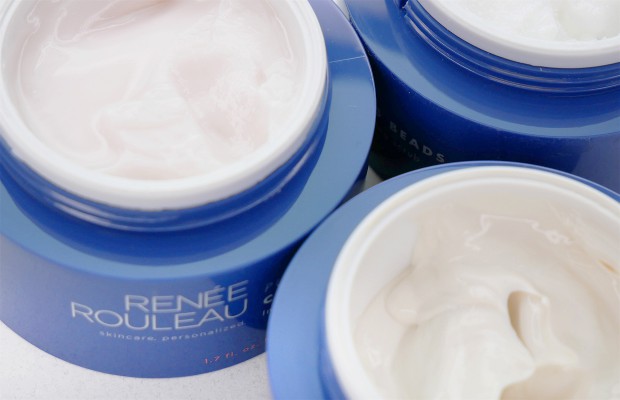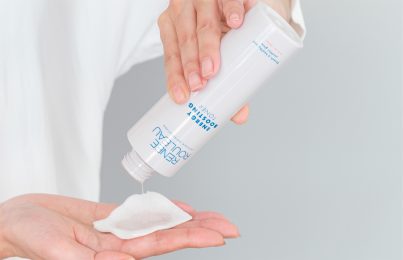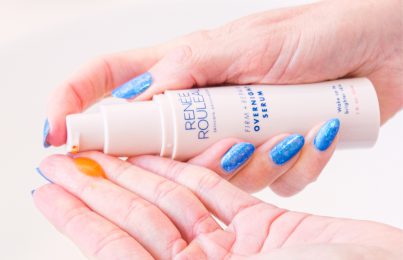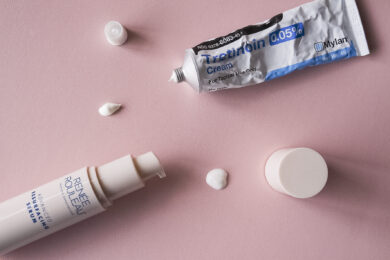Updated 06/18/21. Incorporating active ingredients into your skincare routine is truly one of the easiest and most effective ways to create positive change in your skin. In this post, I’ll explain what it takes for an ingredient to be considered “active.” I’ll also list 20 of my favorite ones, explaining what they do, who they’re best suited for, and whether or not they have any side effects. (If you don’t see one of your favorite active ingredients, don’t worry. There is no shortage of actives out there, but for the sake of brevity, I had to draw the line somewhere!) Keep reading for a crash course on common active ingredients in skincare.
- What Is an Active Ingredient?
- The Best Active Ingredients in Skincare
- Algae
- Astaxanthin
- Benzoyl Peroxide
- Beta Glucan
- Coenzyme Q-10 (Ubiquinone)
- Ergothioneine
- Ethyl Lactate
- Glycerin
- Glycolic Acid
- Green Tea
- Hyaluronic Acid (Also See Sodium Hyaluronate)
- Lactic Acid
- Niacinamide
- Palmitoyl Tripeptide-38 (Peptides)
- Retinol
- Salicylic Acid
- Sea Whip Extract
- Sodium Hyaluronate
- Tetrahexyldecyl Ascorbate (Vitamin C)
- Zinc Oxide
What Is an Active Ingredient?
According to the FDA, an active ingredient in skincare is one that has been determined to give a biological effect based on scientific assessment. Sunscreen is an example of a product that contains ingredients that fall under this official definition. Because sunscreen is considered a drug, the packaging will list the ingredients that actually protect against UV rays as “active.”
In recent years, however, people have started using the word “active” more conversationally. It is now often used to indicate any ingredient within a formula that gives a specific, proposed benefit to the skin. Basically, it’s used to refer to any ingredient that researchers and experts believe to be effective for driving results. Even though I’m a stickler for using proper terminology, thanks to my formal cosmetic chemistry training, I’ve recently loosened up on this and use the word “active” more freely. With that being said, I still think it’s important to understand the true meaning in order to be a well-informed consumer.
The Best Active Ingredients in Skincare
This list of active ingredients is based on both scientific research and my own experience formulating products for 25 years. I believe these active ingredients can truly make a positive (and visible) impact on the skin. That’s why I have chosen to formulate so many of these actives in my own skincare line. Here they are, listed in alphabetical order.
Algae
What Does Algae Do?
Algae are chlorophyll-containing organisms that contain an abundance of vitamins and minerals, giving them considerable renown for “healing” capabilities. This makes algae an ideal ingredient for those whose skin is exposed to environmental stressors (which, in this day and age, is all of us). Algae are effective at repairing the skin’s moisture barrier. In nature, algae are constantly being exposed to extreme conditions, and over time, these plants developed defense systems against the elements. These defense systems are beneficial when applied to human skin. Common types of algae include Ahnfeltia concinna (red marine algae) extract, seahorse plankton, Laminaria digitata (algae) extract, and Chlorella vulgaris extract.
Who Should Use Algae?
Anyone seeking smoother and more supple skin with increased hydration and firmness.
Does Algae Have Any Side Effects?
No, however, if you’re highly allergic to shellfish, conduct a patch test prior to use.
What Renée Rouleau Products Do You Recommend With Algae?
Firm + Repair Overnight Serum, Hydraboost Rescue Creme, Intensive Firming Neck Creme
Astaxanthin
What Does Astaxanthin Do?
Astaxanthin is a powerful carotenoid antioxidant derived from microalgae. It protects tissues, cells, and membranes from destructive free radicals. This helps to reduce the look of wrinkles by encouraging smoother, more youthful-looking skin. Astaxanthin is known to be one of the best active ingredients for preventative aging.
Who Should Use Astaxanthin?
Anyone who wants to prevent and reduce the appearance of wrinkles. It is particularly beneficial for those who spend a lot of time outdoors.
Does Astaxanthin Have Any Side Effects?
Astaxanthin doesn’t have any side effects.
What Renée Rouleau Products Do You Recommend With Astaxanthin?
Firm + Repair Overnight Serum, Total Eye Repair Creme
Benzoyl Peroxide
What Does Benzoyl Peroxide Do?
Benzoyl peroxide is a powerful anti-acne ingredient that starves acne-causing bacteria of nutritional resources and breaks up debris inside clogged pores. It results in a quicker recovery time for infected blemishes.
Who Should Use Benzoyl Peroxide?
Anyone who gets pustular blemishes and whiteheads and who isn’t responding well to salicylic acid or other anti-acne ingredients.
Does Benzoyl Peroxide Have Any Side Effects?
Dryness and flakiness will occur if this ingredient is overused. Since it’s a strong oxidant, and it promotes the formation of free radicals and inflammation, it’s best to limit your use of this ingredient to spot treatments, if possible. I recommend using a moisturizer that contains antioxidants to help offset the free radical activity. Note: some people are allergic to this ingredient, so it’s best to perform a patch test.
Beta Glucan
What Does Beta Glucan Do?
Beta Glucan is a polysaccharide derived from yeast or grains. Its natural polymer-like structure helps the skin retain moisture while protecting it from environmental stressors. It’s also known to soothe irritated skin.
Who Should Use Beta Glucan?
Anyone with acne (cysts, pustules, papules). This ingredient plays a supporting role in acne-clearing routines by lessening breakouts and sensitivity from within.
Does Beta Glucan Have Any Side Effects?
Beta Glucan doesn’t have any side effects.
What Renée Rouleau Products Do You Recommend with Beta Glucan?
Skin Correcting Serum, Daytime Blemish Gel, Phytolipid Comfort Creme, Rapid Response Detox Toner
Coenzyme Q-10 (Ubiquinone)
What Does Coenzyme Q-10 Do?
Coenzyme Q-10 makes the cellular fuel needed for building new cells and tissues more readily accessible. Since cell metabolism slows down with age, this ingredient plays a key role in keeping the face looking youthful, healthy, and vibrant.
Who Should Use Coenzyme Q-10?
Anyone wants to brighten a dull, sluggish complexion, which is why it’s a particularly excellent ingredient for smokers.
Does Coenzyme Q-10 Have Any Side Effects?
Coenzyme Q-10 doesn’t have any side effects.
Ergothioneine
What Does Ergothioneine Do?
Ergothioneine is a naturally occurring amino acid derivative that acts as a superior antioxidant, cell energizer, and brightener. It protects skin from the ozone in smog and airplane cabins, and it interrupts the aging process aggravated by free radicals in the environment. Ergothioneine is outstanding at protecting the mitochondrial membrane against oxidation. It will transfer fatty acids into the mitochondria so that oxygen is used more efficiently to produce more energy.
Who Should Use Ergothioneine?
Anyone with aging, dull-looking skin who wants a brighter and fresher complexion.
Does Ergothioneine Have Any Side Effects?
Ergothioneine doesn’t have any side effects.
What Renée Rouleau Products Do You Recommend with Ergothioneine?
Firm + Repair Overnight Serum
Ethyl Lactate
What Does Ethyl Lactate Do?
Ethyl Lactate is an ester form of lactic acid, which is an AHA (Alpha Hydroxy Acid). Ethyl lactate can significantly reduce the skin’s pH, encouraging the chemical breakdown of sebum (oil) to help purify pores and clear visible bumps and cysts.
Who Should Use Ethyl Lactate?
Anyone in need of relief from painful bumps and cysts.
Does Ethyl Lactate Have Any Side Effects?
Ethyl Lactate doesn’t have any side effects.
What Renée Rouleau Products Do You Recommend with Ethyl Lactate?
Anti Bump Solution
Glycerin
What Does Glycerin Do?
Glycerin is a humectant that is derived from plant oils, the fermentation of sugars, or synthetic sources. It attracts moisture from the air and the lower layers of the skin to deliver it to the epidermis. This helps hold water between the cells to make the skin feel moist and bouncy.
Who Should Use Glycerin?
Anyone who has a skin type that requires deep hydration from water but doesn’t need additional oil.
Does Glycerin Have Any Side Effects?
Glycerin doesn’t have any side effects. However, when it’s used in high concentrations (generally anything over five percent), it can irritate the skin and cause further dehydration when there is little moisture to draw from. This occurs when skin is already dehydrated, surface lipids are low, or the skin is in a hot, dry environment with low humidity (including airplanes). Because of this, most cosmetic formulas don’t use glycerin in high concentrations. Generally, it’s used in concentrations of two to five percent and is combined with emollients to offer other water-binding benefits.
What Renée Rouleau Products Do You Recommend With Glycerin?
Elderberry Soothing Toner, Bio Calm Repair Masque, Moisture Protecting Cleanser
Glycolic Acid
What Does Glycolic Acid Do?
Like ethyl lactate, glycolic acid is an Alpha Hydroxy Acid (AHA) that creates a chemical reaction to lower the skin’s pH. By lowering the pH, glycolic acid dissolves the “glue” that holds dry, expired cells together. This triggers the production of fresher, younger-looking cells. Of all exfoliating acids, glycolic acid has the smallest molecular structure and can penetrate the furthest into the epidermis. This is one of the best active ingredients for improving the skin’s texture and making it appear smoother.
Who Should Use Glycolic Acid?
Anyone who wants to reduce the appearance of wrinkles, fine lines, irregular pigmentation, brown spots, and enlarged pores.
Does Glycolic Acid Have Any Side Effects?
Glycolic acid doesn’t have any side effects, as long as it’s being used correctly. Using an acid incorrectly or too often can damage the skin’s moisture barrier and trigger inflammation.
What Renée Rouleau Products Do You Recommend With Glycolic Acid?
Pore + Wrinkle Perfecting Serum, Pro Results Power Serum, Smoothing Body Serum, AHA/BHA Blemish Control Cleanser
Green Tea
What Does Green Tea Do?
Green tea is rich in catechins and proanthocyanidins, which have been shown to be effective against damaging free radicals known as Reactive Oxygen Species (ROS). It’s a plant-based antioxidant that’s known for its soothing benefits, as well as its ability to calm redness.
Who Should Use Green Tea?
Anyone who wants to prevent and reduce the appearance of wrinkles. It’s a must for anyone who spends a lot of time outdoors.
Does Green Tea Have Any Side Effects?
Green tea doesn’t have any side effects.
What Renée Rouleau Products Do You Recommend With Green Tea?
Firm + Repair Overnight Serum, Redness Care Firming Serum
Hyaluronic Acid (Also See Sodium Hyaluronate)
What Does Hyaluronic Acid Do?
Hyaluronic acid occurs naturally in the body and acts as a lubricant for our joints, nerves, hair, skin, and eyes. Like glycerin, hyaluronic acid is a humectant and attracts moisture from the air as well as from the lower layers of the skin to deliver it to the epidermis. This makes the skin look and feel moist while increasing plumpness and elasticity. In skincare formulations, a concentration of 1%-2% is an effective amount to hydrate the skin. An alternative to hyaluronic acid is the ingredient sodium hyaluronate. See ingredient sodium hyaluronate below.
Who Should Use Hyaluronic Acid?
Anyone who has a skin type that requires a lot of hydration. Skin cells of all types need water to live, so there is no one that wouldn’t benefit from this ingredient.
Does Hyaluronic Acid Have Any Side Effects?
Hyaluronic acid doesn’t have any side effects. However, similarly to glycerin, you won’t experience the full benefits of this ingredient if you live in an exceptionally dry climate, because it won’t have moisture to bind to.
Lactic Acid
What Does Lactic Acid Do?
Lactic acid is an AHA that is sourced from fermented sugar (not milk) or used in a synthetic form. Like other AHAs, it chemically lowers the pH of the skin to exfoliate dry cells. It is a hydrophilic (water-loving) humectant, so it can also increase the skin’s ability to hold on to water while it exfoliates. It has a larger molecule size compared to other AHAs, so it doesn’t penetrate as deeply. This makes it a good option for anyone with sensitive, easily irritated skin.
Who Should Use Lactic Acid?
Anyone who wants to reduce the look of wrinkles, fine lines, irregular pigmentation, brown spots, and enlarged pores. This ingredient is particularly excellent for sensitive skin types.
Does Lactic Acid Have Any Side Effects?
Lactic acid doesn’t have any side effects as long as you’re using it correctly. Using an acid incorrectly or too often can damage the skin’s moisture barrier and trigger inflammation.
What Renée Rouleau Products Do You Recommend With Lactic Acid?
Ultra Gentle Smoothing Serum, Overnight Eye Serum, Mint Renewal Cleanser
Niacinamide
What Does Niacinamide Do?
Niacinamide is an active ingredient that offers multiple benefits. It’s a water-soluble form of vitamin B3 that boosts ceramide levels in the skin, improving its ability to hold on to moisture. Niacinamide does this by stimulating circulation in the dermis through a process known as vasodilation. This ingredient can reduce the appearance of sallowness in the skin, which is caused by the glycation of proteins and results from aging due to environmental damage. It also serves as an antioxidant, protecting cells, membranes, and tissues from damaging free radicals. Niacinamide also helps reduce discoloration (brown spots and post-breakout scars) by preventing the transfer of melanosomes from melanocytes to keratinocytes. Because of its many benefits, niacinamide is one of the best active ingredients in skincare.
Who Should Use Niacinamide?
Anyone looking to improve dryness, dehydration, dullness, blemishes, brown spots, or discoloration.
Does Niacinamide Have Any Side Effects?
Niacinamide doesn’t have any side effects. However, I have heard that some people experience redness when using it in high percentages. This is probably due to the vasodilation process.
What Renée Rouleau Products Do You Recommend With Niacinamide?
Balancing Skin Tonic, Skin Correcting Serum, Sheer Moisture Lotion, Hydraboost Rescue Cream
Palmitoyl Tripeptide-38 (Peptides)
What Does Palmitoyl Tripeptide-38 Do?
Palmitoyl Tripeptide-38 is a type of peptide. Peptides are long or short chains of amino acids, which are the building block of protein. They send signals to cells to make more collagen and thicken the support structure of the skin. Peptides are able to enter the cells and remain intact. Most of them function as moisture-binding agents and almost all of them have cell-communicating capabilities, which means they can send signals to initiate repair. If you want firmer-looking skin, peptides are some of the best active ingredients to use. There are many different types, but I like palmitoyl tripeptide-38 because it is well-researched. Other beneficial types of peptides include the following: palmitoyl oligopeptide, palmitoyl terapeptide-7, acetyl hexapeptide, palmitoyl pentapeptide, dipeptide-2, and caprooyl tetrapeptide. Learn more about peptides.
Who Should Use Palmitoyl Tripeptide-38?
Anyone whose main focus is on preventative aging and desires firmer and smoother-looking skin.
Does Palmitoyl Tripeptide-38 Have Any Side Effects?
Palmitoyl Tripeptide-38 doesn’t have any side effects.
What Renée Rouleau Products Do You Recommend With Palmitoyl Tripeptide-38?
Advanced Resurfacing Serum, Firm + Repair Overnight Serum
Retinol
What Does Retinol Do?
Retinol is derived from pure, bioactive vitamin A. Retinol is a cell-communicating ingredient that is reported to increase cell thickness, affect gene expression, increase the production of collagen, and thin the stratum corneum (the outermost layer of skin that mostly consists of dead cells). With continued use, retinol can improve the appearance of the skin dramatically—it can smooth texture and reduce the appearance of visible wrinkles, lines, large pores, brown spots, and acne scars. This is a go-to ingredient for smoothing and resurfacing, as long as it’s used correctly and consistently.
Who Should Use Retinol?
Anyone over the ages of 25-30 who wants to slow down visible signs of aging and achieve a smoother, more even-toned complexion.
Does Retinol Have Any Side Effects?
Dryness can occur in formulas with concentrations of one percent or higher, but not all formulas are the same (on that note, my favorite blogger Caroline Hirons has a video series about retinol in which she reviews different formulas). If you experience sensitivity, look for a gentler formula (read four important things to look for when choosing a retinol product). This ingredient is not recommended for use during pregnancy.
What Renée Rouleau Products Do You Recommend With Retinol?
Advanced Resurfacing Serum
Salicylic Acid
What Does Salicylic Acid Do?
Salicylic acid is a Beta Hydroxy Acid (BHA). It’s keratolytic, which means it breaks down the keratin that makes up the horny outer layers of the skin. This makes salicylic acid ideal for preventing and clearing blemishes. Since it’s an exfoliant, it will also smooth the skin and fade acne scars. The difference between BHAs and AHAs is that BHAs are oil-soluble, so they can penetrate the pore lining more effectively. This makes salicylic acid one of the best ingredients for preventing clogged pores, blackheads, and closed comedones (non-infected bumps under the skin).
Who Should Use Salicylic Acid?
Anyone who gets blemishes in their teen or adult years and wants a clearer, smoother complexion.
Does Salicylic Acid Have Any Side Effects?
Salicylic acid doesn’t have any side effects, as long as you’re using it correctly. Using an acid incorrectly or too often can damage the skin’s moisture barrier and trigger inflammation. This ingredient is generally not recommended for use during pregnancy.
What Renée Rouleau Products Do You Recommend With Salicylic Acid?
AHA/BHA Blemish Control Cleanser, Rapid Response Detox Masque, BHA Clarifying Serum, Daytime Blemish Gel
Sea Whip Extract
What Does Sea Whip Extract Do?
Sea whip extract is a soothing and anti-inflammatory ingredient that helps reduce the appearance of redness and sensitivity. Sea whip extract is produced by sea whip, a marine organism also known as pseudopterogorgia elisabethae. Sea whip extract works by inhibiting the inflammatory enzyme phospholipase A2. This enzyme is often responsible for irritation. With continued use, sea whip extract can decrease puffiness, discomfort, and surface tenderness. It can also help strengthen weakened components of the skin that can lead to chronic redness. This ingredient is considered one of the best for sensitive skin types.
Who Should Use Sea Whip Extract?
Anyone with redness, blotchiness, rosacea, or acne who wants calmer skin.
Sea Whip Extract side effects
Sea whip extract doesn’t have any side effects.
What Renée Rouleau Products Do You Recommend With Sea Whip Extract?
Purifying Face Wash, Redness Care Firming Serum, Phytolipid Comfort Cream
Sodium Hyaluronate
What Does Sodium Hyaluronate Do?
Sodium hyaluronate is a more stable, bioactive salt form of hyaluronic acid, although the names are often used interchangeably. Sodium Hyaluronate recharges the skin’s moisture levels by binding 1000 times its weight in water to the skin’s surface. Sodium Hyaluronate comes in many different molecular weights, with the smallest penetrating furthest into the epidermis, and the largest staying on top. This ingredient is excellent for repairing a damaged moisture barrier and preventing transepidermal water loss caused by over-exfoliation, a dry climate, or sun exposure.
Who Should Use Sodium Hyaluronate?
Anyone whose skin is in need of hydration. All cells need water to live, so any skin type can benefit from this ingredient.
Does Sodium Hyaluronate Have Any Side Effects?
Sodium Hyaluronate doesn’t have any side effects. However, similarly to glycerin, you won’t experience the full benefits of this ingredient if you live in an exceptionally dry climate, because it won’t have moisture to bind to.
What Renée Rouleau Products Do You Recommend With Sodium Hyaluronate?
Glow Enhancing Creme, Skin Drink Concentrate, Rapid Response Detox Masque
Tetrahexyldecyl Ascorbate (Vitamin C)
What Does Tetrahexyldecyl Ascorbate Do?
Tetrahexyldecyl Ascorbate is a lipid-soluble ester form of vitamin C. It is known for its stability and its delivery advantages over water-soluble forms of vitamin C, such as L-ascorbic acid and magnesium ascorbyl phosphate. This ingredient is one of the most stable and effective forms of vitamin C and is therefore generally tolerated better by those with sensitive skin. Tetrahexyldecyl Ascorbate is clinically proven to build collagen and increase firmness. In addition, it decreases dark spots and hyperpigmentation and reduces signs of sun damage. Tetrahexyldecyl Ascorbate is generally retained in the epidermal layers longer than other types of vitamin C, providing prolonged benefits (some water-soluble forms tend to pass through the epidermis quickly, which causes them to oxidize and reduces their activity). Using it in conjunction with daily sunscreen will significantly increase UV protection.
Who Should Use Tetrahexyldecyl Ascorbate?
Anyone with aging concerns who are looking for brighter, fresher, and more even-toned skin.
Does Tetrahexyldecyl Ascorbate Have Any Side Effects?
Tetrahexyldecyl Ascorbate doesn’t have any side effects.
What Renée Rouleau Products Do You Recommend With Tetrahexyldecyl Ascorbate?
Vitamin C & E Treatment, Vitamin C Eye Brightener, Vitamin-Infused Cleansing Emulsion, Pro Remedy Oil
Zinc Oxide
What Does Zinc Oxide Do?
Zinc oxide is a mineral that provides broad-spectrum UV protection (protection against both UVB and UVA rays) while potentially inhibiting the formation of hyperpigmentation. Zinc oxide is considered a physical blocker since it works by sitting on top of the skin to deflect and scatter damaging UV rays.
Who Should Use Zinc Oxide?
All skin types should use zinc oxide, including acne-prone skin types. This ingredient is particularly ideal for those with heat-activated sensitivity, like those who are prone to rosacea and redness.
Does Zinc Oxide Have Any Side Effects?
Zinc oxide doesn’t have any side effects.
What Renée Rouleau Products Do You Recommend With Zinc Oxide?
Weightless Protection SPF 30
There you have it—20 of my favorite active ingredients in skincare. I know this is a lot to take in, but I hope you start using at least a few of what I consider to be the very best ingredients to benefit the skin! To find out what products are best suited for you and your unique concerns, take the skin type quiz.
Next, read all about ingredient percentages and what product labels won’t tell you.
Celebrity Esthetician & Skincare Expert
As an esthetician trained in cosmetic chemistry, Renée Rouleau has spent 35 years researching skin, educating her audience, and building an award-winning line of products. Her hands-on experience as an esthetician and trusted skin care expert has created a real-world solution — products that are formulated for nine different types of skin so your face will get exactly what it needs to look and feel its best. Trusted by celebrities, editors, bloggers, and skincare obsessives around the globe, her vast real-world knowledge and constant research are why Marie Claire calls her “the most passionate skin practitioner we know.”




Comments:
I am 47, African American, deep tone with oily, occasional breaks outs with uneven skin and while this information is AWESOME ( the best I’ve read so far) it can be a bit overwhelming to know what products to use. How do you know which to mix and match?
Posted By: Ericka |
I suggest taking the skin type quiz! At the end of the quiz you will receive a list of products that will fit your needs and concerns. If you think a personalized routine is what you are looking for we also offer one on one virtual consultations with estheticians. To book your consultation click here.
Posted By: Ella Stevenson |